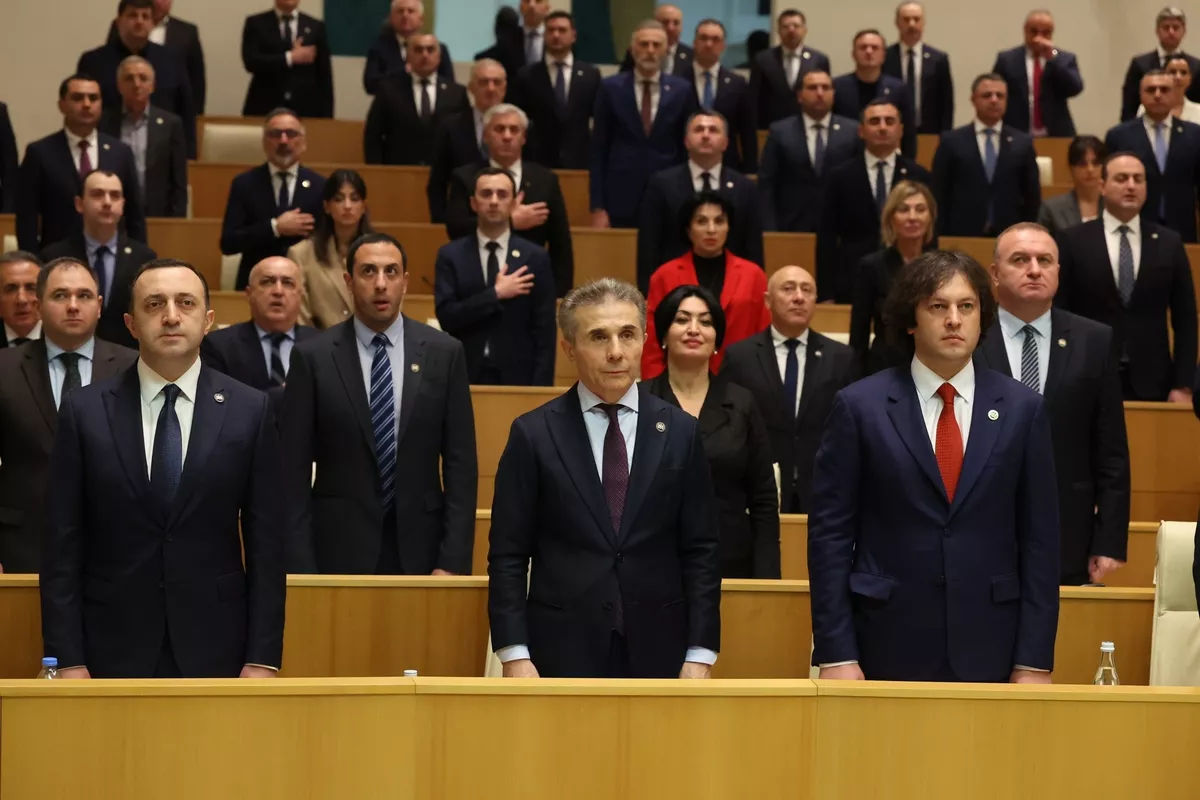
Bidzina Ivanishvili (front, center) surrounded by his Georgian Dream party’s top officials and legislators. (Photo: Parliament of Georgia)
Having largely suppressed domestic opposition, the authoritarian regression in Georgia is beginning to turn in on itself.
The chief catalyst for the infighting in the ruling Georgian Dream party appears to be, unsurprisingly, a desire for money and power. Recent signs of the growing internal wrangling include the unexpected arrests of former allied businessmen and high-ranking officials, as well as an alleged suicide attempt by a former top-level party official, The Caspian Post reports citing Eurasianet.
“Bloody fights over how to divide money stolen from the people,” is how Giorgi Gakharia, a former prime minister and once the face of Georgian Dream, now an opposition leader, described the turmoil within the ruling elite.
The most recent incident occurred July 27, when former deputy defense minister Giorgi Khaindrava and a former top procurement official at the ministry, Vladimer Ghudushauri, were detained on suspicion of embezzlement. A relative of Juansher Burchuladze, who served as defense minister from 2021-24, was also named as a suspect in the scheme. The trio is accused of rigging tenders, inflating prices, and funneling about $480,000 in medical equipment contracts to handpicked companies.
Independent watchdogs have long exposed corruption in Georgia’s state institutions, particularly in rigged procurement deals, amid Georgian Dream’s ongoing pivot away from Western integration and the government’s embrace of authoritarian practices. Yet Georgian Dream has only recently begun targeting alleged corruption cases, moves critics dismiss as selective and politically calculated. Rather than genuine clean-up efforts, these cases are seen as motivated by desire to sideline former officials who have fallen out of favor with top party officials, especially the ruling party’s impresario, Bidzina Ivanishvili.
Political analyst Gia Khukhashvili described recent developments as a personal reckoning for Ivanishvili. “Now it is time for a kind of harvest for Bidzina Ivanishvili,” he told RFE/RL. “He felt disadvantaged by the fact that everyone around him is making money, and he, based on all the problems [i.e. sanctions] that have arisen in the West, is losing money. And now he wants to cut it all off.”
The Defense Ministry procurement scandal is just one in a string of unexpected moves against former Georgian Dream loyalists. In June, former deputy economy minister Romeo Mikautadze was arrested on corruption charges, accused of laundering money while in office and is now facing up to 12 years in prison.
“They demanded 250 million GEL (around $90 million) from Mikautadze. When he refused, he was arrested as a show of intimidation,” alleged Levan Khabeishvili, a prominent opposition figure and ex-chair of United National Movement, which held power in Georgia from 2004-2012.
On July 7, former Adjara government head Tornike Rizhvadze was hospitalized with a gunshot wound to the chest. Prosecutors characterized the incident as a suicide attempt, while state-aligned media outlets published the contents of a handwritten note allegedly penned by Rizhvadze, in which he claimed he had been accused of corruption and protecting drug dealers. In the letter, he wrote, “I rely on Mr. Bidzina [Ivanishvili] and the Prime Minister [Irakli Kobakhidze] that they will protect my family.”
Rizhvadze resigned his Adjara post in April. His hospitalization occurred just days after Khabeishvili alleged that a former official had fallen out with Ivanishvili and was being forced to repay over $100 million. Suspicion fell on Rizhvadze that he was the official referred to by Khabeishvili.
“My friends, employees, family members, all acted on my instructions and orders. They are all innocent. I am responsible for everything in my life,” Rizhvadze writes, according to the note shared by TV channels.
Earlier in July, an influential businessman, Giorgi Ramishvili, known as ‘Zarala’, was detained at Tbilisi Airport after authorities claimed to have found an illegal firearm in his luggage. But many observers remain skeptical. Given Ramishvili’s vast influence, business empire, and deep political ties, the incident seems too calculated to be simple carelessness, they believe.
Critics say that after targeting activists, journalists, and political figures, the crackdown is now extending to major business figures. Particularly those who have shown signs of wavering loyalty to Georgian Dream, as ‘Zarala’ subtly did at the outset of the pro-EU and anti-government protests.
While the seeming internal crackdown has accelerated in July, it got underway in May with the arrest of Giorgi Bachiashvili, who claims he was abducted while abroad and forcibly returned to Georgia to face fraud and embezzlement charges. Bachiashvili formerly headed Ivanishvili’s co-investment fund and was a member of the billionaire’s inner circle. He ended up being sentenced to 11 years in prison.
Georgian Dream officials are now pushing legislation to make it significantly easier to recover damages in more than a dozen types of financial and economic crimes. The bill also provides for sweeping penalties, including barring convicts from leaving the country for years, extending asset seizures to their relatives, and penalizing anyone who offers even minimal assistance in abetting financial crimes.
The recent arrests are not the only signs of Georgian Dream turning on its own. In recent months, a wave of high-ranking officials, some sanctioned by the West for their roles in the country’s violent crackdowns and abandonment of democratic practices, have been quietly pushed out. Among them: former interior minister Vakhtang Gomelauri, State Security head Grigol Liluashvili, and Special Tasks chief Zviad Kharazishvili, aka ‘Khareba’, all key figures behind the prolonged crackdown against anti-government protesters.
The purge has not stopped there. Levan Davitashvili, a former deputy prime minister, widely seen as Georgia’s last remaining technocrat with open lines to Western leaders, was also sacked. Many observers view the reshuffle as a strategic shake-up, swapping one circle of Ivanishvili’s favorites for another amid simmering internal tensions.
Share on social media